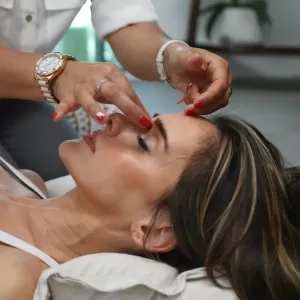Restful Nights: Exploring the Benefits of Acupuncture for Insomnia
Is it just me, or does the pursuit of a good night’s sleep these days feel like an elusive dream? Whether it’s not being able to fall asleep, tossing and turning all night, or waking up feeling like you barely slept a wink, the effects of insomnia are extremely disruptive to leading a full, energetic life. Insomnia not only leaves us feeling tired and fatigued but can also have far-reaching consequences on our physical and emotional well-being.
If you’re among those struggling with insomnia, Traditional Chinese Medicine (TCM) offers a time-tested approach that may help: acupuncture. In this blog post, we will delve into the topic of acupuncture for insomnia, exploring its evidence-based benefits and how it can promote better sleep from the perspective of TCM.

Understanding Insomnia
Insomnia is a sleep disorder characterized by difficulty falling asleep, staying asleep, or experiencing non-restorative sleep. It can have various causes, including stress, anxiety, hormonal imbalances, chronic pain, or lifestyle factors. TCM views insomnia as a disruption in the flow of Qi (energy) and identifies imbalances in specific organ systems, most notably the Heart, Liver, and Spleen.
The Principles of Acupuncture
Acupuncture is a central component of TCM and involves the insertion of thin needles into specific acupoints along energy channels, known as meridians, in the body. This practice aims to restore the harmonious flow of Qi and rebalance the body’s energy systems. In the case of insomnia, acupuncture targets acupoints associated with calming the mind, promoting relaxation, and regulating the organ systems linked to sleep disturbances.
Let’s Explore the Benefits of Acupuncture for Insomnia
1. Regulation of the Circadian Rhythm and Yin-Yang Balance:
- Evidence-Based Perspective: Acupuncture can influence the release of melatonin, a hormone that regulates the sleep-wake cycle. Studies have shown that acupuncture can increase melatonin secretion, which can help synchronize the body’s internal clock and improve sleep quality. Melatonin plays a key role in the circadian rhythm, and its regulation is essential for a healthy sleep pattern.
- TCM Perspective: TCM views sleep and insomnia as disruptions in the body’s Yin-Yang balance and natural circadian rhythms. Insomnia is often associated with excess Yang energy, leading to restlessness and difficulty falling asleep. Acupuncture can help rebalance Yin and Yang energies and restore the body’s natural circadian rhythm, promoting better sleep
2. Stress Reduction and Neurotransmitter Regulation:
- Evidence-Based Perspective: Acupuncture has been shown to reduce stress hormones such as cortisol and activate the release of endorphins, which are natural painkillers and mood stabilizers. By reducing stress and anxiety, acupuncture can create a conducive environment for the sleep cycle. The calming effects of acupuncture can also influence neurotransmitters like serotonin and gamma-aminobutyric acid (GABA), which are associated with relaxation and sleep.
- TCM Perspective: In TCM, emotional factors such as stress and anxiety are often seen as contributors to sleep disturbances. Acupuncture can help to calm the Shen (mind) by stimulating points that reduce emotional tension and soothe the Heart. This can help alleviate stress or anxiety-related insomnia.
3. Improving Circulation and Blood Flow:
- Evidence-Based Perspective: Acupuncture can help improve blood circulation and regulate blood flow. By addressing issues related to blood flow, acupuncture may reduce symptoms like muscle tension, headaches, and restless legs that can disrupt sleep.
- TCM Perspective: In TCM, the Liver plays a significant role in regulating the flow of Qi (energy) and Blood throughout the body. An imbalance in Liver Qi can lead to symptoms such as irritability, anxiety, and difficulty falling asleep. Acupuncture helps to harmonize Liver Qi, thereby alleviating restlessness and promoting a sense of calm conducive to better sleep.
Lifestyle Changes for Insomnia from a TCM Perspective
Beyond consistent acupuncture treatments, I often encourage my patients to look at lifestyle factors that may be playing a role in their insomnia. Small changes can have a great impact on the sleep-wake cycle. Here are three that anyone can benefit from:
- Get sunlight in your eyes within two hours of waking up, ideally before 10 am
Our bodies have a natural internal clock known as the circadian rhythm, which regulates various physiological processes, including sleep-wake cycles. Exposure to sunlight, particularly in the morning, helps synchronize our circadian rhythm. Even if it’s cloudy, going outside for a 10-20 minute walk in the morning for some sunlight exposure is essential.
- Include foods that nourish Yin
Insomnia in TCM is often associated with what we call Yin Deficiency. To support your Yin stores and promote better sleep, consider incorporating the following foods into your diet: cooked leafy greens, almonds, sesame seeds, pear, apple, cucumber and honey.
- Reduce stimulating foods and beverages, especially in the evening
This is a tough one, especially when you rely on coffee or tea after a poor night’s sleep. And I’m sure it’s not the first time you’ve been told that caffeine can have negative effects on your sleep! But doing your best to limit caffeine to before 10am is best practice when it comes to insomnia. From a TCM perspective, an excess of spicy foods like hot peppers, garlic, curry, mustard and black pepper can also be very stimulating. Limiting these foods while getting to the bottom of what’s going on with your specific sleep issues can be really helpful.
When it comes to insomnia, there can be lots of different factors at play. It’s important to note that everyone is unique, and treatment often looks different for different people! It’s always a good idea to consult with a professional to receive more individualized support.
If you’re looking for guidance and support for your insomnia, you can book an appointment with me here and follow me on Instagram @pokedbydee to learn more.

